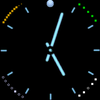-
• #2
Hi!
Is it possible to read the temperature and humidity values on certain intervals and store them to internal memory?
Yes, absolutely! There's 40kB of flash space in normal builds (some of this will be needed for your code), but lets assume you store 2 bytes for temperature and 1 for humidity, and you use 10k of program code. That means 30kB/3 = 10,000 readings.
We can do a minimal build as well, in which case 90kB of memory is available for storage.
If so, how long I can expect the battery to last and is there any persistence in the memory if the battery dies?
Doing something minor like reading data every 12 hours, and if you so something like disabling Bluetooth unless the button is pressed, you could get a year pretty easily.
The only downside for you is there's no humidity sensor built in so you would have to add your own external sensor (which isn't hard - several different types are supported).
-
• #3
Thanks for you answer. Now, when I think about it, the Puck.js has a lot of stuff in it, that I don't actually even need. I need to investigate further whether I should just do a custom setup of sensors. Maybe I could even have a wifi-connection in it.
-
• #4
Maybe I could even have a wifi-connection in it.
Well, there goes your battery! ;-) Actually I think the Puck would be perfect for this. Press the button to start BLE, download to phone, back to low power data collection. And adding the humidity sensor shouldn't affect the footprint.
 Gordon
Gordon FullBeardDeveloper
FullBeardDeveloper yngv126399
yngv126399
Hi,
I'm looking for an IOT solution to store and track the temperature and humidity of a root cellar. I need samples only for every 12 or 24 hours, but I would like the sensor to be able to store data for months or even years, because I don't want to be downloading the data to my mobile every week. Is it possible to read the temperature and humidity values on certain intervals and store them to internal memory? If so, how long I can expect the battery to last and is there any persistence in the memory if the battery dies?
Writing the software isn't a problem. I'm just curious whether this use case is generally doable with Puck.js or not. I was also looking at Ruuvi Tag, which has something similar already build in, but the internal memory for sensory data is only for the last 10 days. That is not enough for me. I want something more long term.